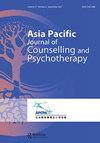Actual and expected roles of school counsellors: exploring multiple perspectives of stakeholders in South India
IF 0.2
4区 心理学
Q4 PSYCHOLOGY, CLINICAL
Asia Pacific Journal of Counselling and Psychotherapy
Pub Date : 2023-10-24
DOI:10.1080/21507686.2023.2271582
引用次数: 0
Abstract
ABSTRACTThe study examined the perception of the actual and expected roles of school counsellors (SC) from the perspective of school administrators, counsellors, teachers, students, and parents living in South India. Stakeholders recruited using multi-stage cluster sampling (N = 1029)completed the 42item International Survey of School Counsellors Activities exploring the perception about SC roles. Results indicated a significant difference among teachers, students, and parents. Teachers were more aware than students and parents about the SCs’ actual role in Individual Works with Students, and they had higher levels of expectations of SC role. However, students were more aware of the actual roles , like Group Work with Students, College and Career Counseling, and Prevention Work. Future research should focus on a multi-faceted approach to redefining the SC role.KEYWORDS: School counsellor rolesstakeholdersschool counselling systemmulti-stage cluster samplingSouth India Disclosure statementNo potential conflict of interest was reported by the authors.Additional informationNotes on contributorsAnjali Miriam DeyAnjali Miriam Dey The corresponding author has received her Doctorate in Psychology. This is one of the first few experiences of publishing a research article and has been looking forward to getting at least some feedback about the paper. More than 90% of the work has been done by the corresponding author including drafting the research proposal, reviewing literature, collecting and analysing the data, interpreting and reporting the results.Elizabeth ThomasElizabeth Thomas The co-author is the Ph.D. supervisor to the first author. The author was responsible for guiding the direction of the research and evaluating its progress. Key contributions was to evaluate and modify the structure of reporting the results and bringing more structure into the presentation of discussion chapter.学校辅导员的实际和预期角色:探索南印度利益相关者的多重视角
摘要本研究从南印度的学校管理者、辅导员、教师、学生和家长的角度考察了学校辅导员的实际角色和期望角色。使用多阶段整群抽样(N = 1029)招募的利益相关者完成了42项的学校辅导员活动国际调查,探讨了对辅导员角色的看法。结果显示,教师、学生和家长之间存在显著差异。教师比学生和家长更了解SC在学生单独作业中的实际角色,并且对SC的角色有更高的期望。然而,学生们更了解实际的角色,如与学生的小组工作,大学和职业咨询,以及预防工作。未来的研究应侧重于从多方面重新定义SC的作用。关键词:学校辅导员角色,利益相关者,学校咨询系统,多阶段集群抽样,南印度披露声明,作者未报告潜在的利益冲突。作者简介通讯作者获得心理学博士学位。这是发表一篇研究文章的最初几个经历之一,我一直期待着至少能得到一些关于论文的反馈。超过90%的工作由通讯作者完成,包括起草研究计划,审查文献,收集和分析数据,解释和报告结果。合著者是第一作者的博士生导师。作者负责指导研究方向和评价研究进展。主要的贡献是评价和修改报告结果的结构,并使讨论的介绍章节更有结构。
本文章由计算机程序翻译,如有差异,请以英文原文为准。
求助全文
约1分钟内获得全文
求助全文

 求助内容:
求助内容: 应助结果提醒方式:
应助结果提醒方式:


